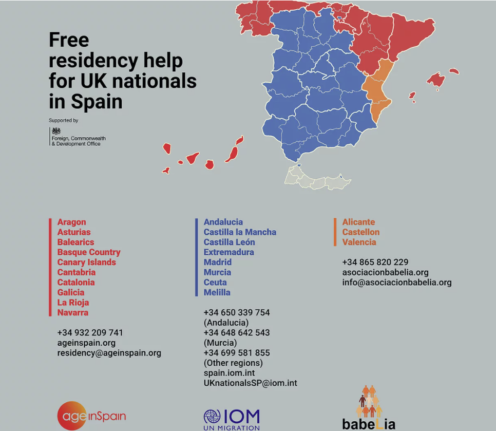UK veterans and/or their family members living anywhere in Spain (and whatever their age) can contact Age in Spain for information and varying levels of support – according to their residency needs.
“As Patron of the Royal British Legion in Spain, I am committed to making sure that veterans living here get the support they deserve,” British Ambassador to Spain Hugh Elliott said.
“Therefore, if any veterans of the UK´s Armed Forces, or their family members, living in Spain are struggling with the residency process, I encourage them to access the free support available from Age in Spain, Babelia and IOM who the British government has helped fund so that they can provide the help to those who need it most, supporting them to continue their lives in Spain.”
“It is important to remember that, as with other UK Nationals, Veterans who were legally living in Spain before December 31st 2020 can apply for residency under the conditions of the Withdrawal Agreement, even if they have not yet started the process,” writes Age in Spain.
“Theres still time.”
Veterans and their families can contact the Age in Spain Residency Helpline on: +34 932 20 97 41 or email [email protected]
READ ALSO:
BREXIT: When is the deadline for Brits to apply for residency in Spain?
Why some residency applications by Britons in Spain are rejected (and how to appeal)
Commenting on the importance of reaching Armed Forces veterans, Age in Spain Director, Helen Weir, said: “There is a special sense of achievement when we help someone who is a veteran of the UK’s Armed Forces. Partly that’s because of Age in Spain’s longstanding relationship with the network of great services organisations and with individual veterans in Spain and in the UK.
“But there’s also the sense of privilege when it’s our turn to serve, sometimes in very little ways, people who served us – sometimes in unimaginably important ways.”
How Age in Spain helps Armed Forces veterans with obtaining residency in Spain
One example of how the Age in Spain residency helpline recently helped an Armed Forces veteran’s family is the following:
“John (name changed) phoned the Age in Spain Residency Helpline to ask for help as he was the full-time carer for his disabled mother, who had been resident in Spain for 20 years but Jonny needed to start his own residency process.
“He had previously not seen himself as resident but only his mum´s carer but the end of the transition process made it clear that he needed to act to secure his rights.
“He was worried as he did not seem to meet the criteria as he was an informal unpaid carer with no salary.
“Age in Spain discussed John’ss options for residency with him and he has now requested all his documentation, opened a bank account and is progressing with his residency application with confidence on how to meet the criteria.”
Which organisations are offering help to Britons with registering in Spain?
Age in Spain is one of three organisations delivering the United Kingdom Nationals Support Fund (UKNSF) in Spain.
The UK Government recently announced it was extending its support for potentially at-risk groups including pensioners, disabled people and those with language difficulties who live in Spain by continuing the activity of the UK Nationals Support Fund (UKNSF) and supplementing it with an additional £1 million.

In Spain, the UKNSF is delivered by Age in Spain, Babelia and IOM.
Age in Spain is the acting as the point of contact for Armed Forces veterans who need help with residency from anywhere in Spain.
For the general UK National population , Age in Spain supports people living in Aragon, Asturias, Balearics, Basque Country (Pais Vasco), Canary Islands, Cantabria, Catalonia, Galicia, La Rioja, Navarra).
· email: [email protected]/[email protected]
· helpline: +34 932 20 97 41 available Mon to Fri, 9am to 6pm




 Please whitelist us to continue reading.
Please whitelist us to continue reading.
Don’t enjoy too much of that real strong sun in that area of the world. Luke’s book 12 and 14 forsake everything, and everybody, and your life 4 Him.
Matthew’s 5-7 work for Me, never for money, then I’ll give you the food and clothes.
Mark’s 16 share the Truth to everyone.
John’s 17 work together, to show love.
Do not take the Mark of the Beast; right hand or forehead, only way to buy or sell (not a mask or vaccine, but could be a quantum implant or tattoo thing). The Revelation 13 + 14.
USA maybe the Babylon, to be destroyed with fire in 1 hour. Revelation 17 + 18.